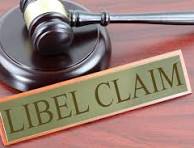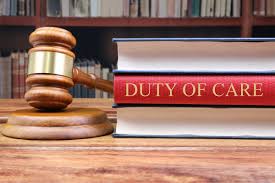
Introduction:
Libel is a statement in written form which causes a person to be exposed to hatred, ridicule or contempt, i.e., that is to be shunned or avoided and to be lowered in the estimation of right-thinking people in the society. Put in another way, to be disparaged in his profession or trade. See the case of Guardian Newspapers Ltd v. Ajeh (2011) Vol. 3-4, MJSC 104
Definition of Libel:
Libel is defined as a method of defamation expressed by print, writing, pictures or signs: any publication that is injurious to the reputation of another, a false and unprivileged publication in writing of a defamatory material; a malicious written or printed publication which tends to blacken a person’s reputation or to expose him to public hatred or ridicule, contempt or to injure him in his business or profession. See the case of Corabi v. Curtis Publication Co 441 pgs 432, 273 A, 2d 899, 904, Black’s Law Dictionary, Sixth Edition page 915.
Note that there are two (2) categories of tort of defamation which is either libel or slander, the difference being that libel is in the written form while slander is spoken.
Essential Ingredients of libel:
The essential ingredients of libel are:
a. The words complained of must have been written,
b. The publication must be false,
c. The words must be defamatory or convey defamatory imputation,
d. The words must refer to the plaintiff,
e. It must be the defendant who published the words, and
f. The onus is on the plaintiff to prove he was the one referred to in the alleged libel.
Duty on the plaintiff in an action of libel to reproduce verbatim, the passage complained of:
In an action of libel, the defamatory passage or statement are of tremendous importance and so the plaintiff who claims that an statement, article or passage is libelous of him must reproduce the whole article verbatim or the particular passage he complains of in his pleadings. No matter how long the article is, it must be reproduced to show the defamatory statement of libel on him. See the case of D.D.G.A Pharmaceuticals Ltd v. Times Newspapers Ltd(1973) 1 QB pg 21, Okafor v. Ikeanyi and Ors (1979) 12 NSCC pg. 43. It is important to note that the duty lies on the plaintiff to prove that he was the one referred to in the alleged libel.
Factors to be taken into consideration for the award of damages in an action for libel:
Libel is a wrong which the law imputes general damages. Once a plaintiff proves that a libel has been published of him without legal justification, his cause of action is complete. He needs not prove that he has suffered any resulting actual damage or injury to his reputation as such damages is presumed. See the case of Jones v. Jones (1916) 2 AC 481.
In libel cases, once the offensive article, statement or passage is found to be libelous of the plaintiff, damages follow and the damages awarded is general damages. On the other hand, where there is direct pecuniary benefits from the offensive publication, punitive damages are awarded. See the case of Awolowo v. Kingsway Stores Ltd & Anor. (1968) 2 ANLR 27.
In awarding damages once the offence of libel is established, the trial court must consider the following factors when exercising judicial authority viz:
a. The standing of the plaintiff in the society,
b. The nature of the libel,
c. The mode and extent of the publication,
d. The refusal to retract or render an apology to the plaintiff, and
e. The value of the local currency
See the cases of Mayange v. Panoh Nigeria Ltd (1994) 7 NWLR (Pt. 358) 570 and Ziks Press Ltd v. Alvan Ikoku 13 WACA pg. 188.
Principles which should serve as a guide in the determination of what is adequate damage in libel cases:
The following facts ought to be taken into consideration in determining what is adequate damage in libel cases viz:
a. The award must be adequate to repair the injury to the plaintiff’s reputation. This does not require proof of pecuniary loss.
b. The award must atone for the assault on the plaintiff’s character and pride which were unjustifiably invaded.
c. It must reflect the reaction of the law to the impudent and illegal exercise in the course of which the libel was unleashed by the defendant,
d. It must also take into account the loss of social esteem and the natural grief and distress to which the plaintiff may have been put,
e. The fact that the defendant did not who any remorse and did not care whether or not the plaintiff’s reputation or feeling was injured,
f. The rate of inflation which has adversely affected the value of the national currency,
Read more about the various legal services offered by Nomos Legal Practice on our website at: https://www.nomoslegalpractice.com or send email to: nomoslegalpractice@gmail.com or info@nomoslegalpractice.com and you can also send WhatsApp messages to our phone numbers at: 0806-809-5282 / 0805-101-9362 to speak with one of our team members for dedicated legal services.



